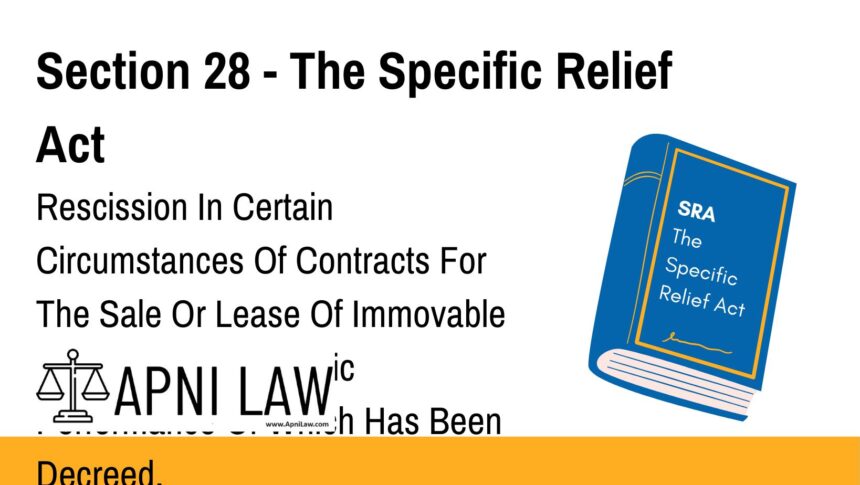Code: Section 28 – The Specific Relief Act
Section 28.
(1) Where in any suit a decree for specific performance of a contract for the sale or lease of immovable property has been made and the purchaser or lessee does not, within the period allowed by the decree or such further period as the court may allow, pay the purchase money or other sum which the court has ordered him to pay, the vendor or lessor may apply in the same suit in which the decree is made, to have the contract rescinded. On such application, the court may, by order, rescind the contract either so far as regards the party in default or altogether, as the justice of the case may require.
(2) Where a contract is rescinded under sub-section (1), the court—
(a) shall direct the purchaser or the lessee, if he has obtained possession of the property under the contract, to restore such possession to the vendor or lessor; and
(b) may direct payment to the vendor or lessor of all the rents and profits which have accrued in respect of the property from the date on which possession was so obtained by the purchaser or lessee until restoration of possession to the vendor or lessor, and, if the justice of the case so requires, the refund of any sum paid by the vendee or the lessee as earnest money or deposit in connection with the contract.
(3) If the purchaser or lessee pays the purchase money or other sum which he is ordered to pay under the decree within the period referred to in sub-section (1), the court may, on application made in the same suit, award the purchaser or lessee such further relief as he may be entitled to, including in appropriate cases all or any of the following reliefs, namely:—
(a) the execution of a proper conveyance or lease by the vendor or lessor;
(b) the delivery of possession, or partition and separate possession, of the property on the execution of such conveyance or lease.
(4) No separate suit in respect of any relief which may be claimed under this section shall lie at the instance of a vendor, purchaser, lessor or lessee, as the case may be.
(5) The costs of any proceedings under this section shall be in the discretion of the court.
Explanation of Section 28 – The Specific Relief Act
Overview
Section 28 of The Specific Relief Act addresses the situation where a court has decreed specific performance of a contract for the sale or lease of immovable property, but the purchaser or lessee fails to comply with the conditions set forth in the decree—specifically the payment of the agreed-upon purchase money or other sums. In such cases, the vendor or lessor has the option to apply for rescission of the contract.
Key Provisions
- Rescission of Contract: If the purchaser or lessee defaults on payment, the vendor or lessor can ask the court to rescind the contract in part or entirely. The court will decide the extent based on the justice of the case.
- Restoration of Possession: If the purchaser or lessee has taken possession of the property, they may be required to restore it to the vendor or lessor.
- Payment of Profits: The court may also order the purchaser or lessee to pay the vendor or lessor all the rents and profits accrued from the property until the possession is returned.
- Further Relief for Payment: If the purchaser or lessee eventually pays the required amount within the allowed period, the court may provide further relief, such as directing the vendor or lessor to execute the necessary conveyance or lease, and delivering possession of the property.
- No Separate Suit: No separate suit can be filed for the reliefs under this section by any party involved.
Illustration
Example 1: Vendor Rescinding the Contract
A purchaser who had been ordered to pay a sum of money for the purchase of immovable property under a decree for specific performance fails to make the payment within the stipulated time. The vendor applies to the court for rescission of the contract. The court rescinds the contract entirely and orders the purchaser to return possession of the property if they had already taken possession.
Example 2: Purchaser Paying After Deadline
After the deadline for payment has passed, the purchaser decides to make the payment of the purchase money. The court, upon application, may then order the vendor to execute the proper conveyance and deliver possession of the property to the purchaser.
Common Questions and Answers on Section 28 – The Specific Relief Act
1. What happens if the purchaser or lessee fails to pay within the allowed period?
- Answer: The vendor or lessor can apply to the court for rescission of the contract, and the court may rescind the contract either partially or fully, depending on the justice of the case.
2. Can the purchaser or lessee avoid the rescission by paying after the deadline?
- Answer: Yes, if the purchaser or lessee pays within the period allowed by the court (or the extended period), the court may provide further relief, including the execution of a conveyance or lease and delivery of possession.
3. Can a vendor or lessee file a separate suit for the relief under Section 28?
- Answer: No, the reliefs available under Section 28 must be claimed within the same suit, and no separate suit can be filed.
4. Does the court have discretion in awarding reliefs?
- Answer: Yes, the court has discretion over the reliefs to be awarded, including whether to rescind the contract, and whether to order the restoration of possession and payment of rents and profits.
Conclusion
Section 28 of The Specific Relief Act offers a remedy to vendors or lessors when a purchaser or lessee defaults on the payment following a decree for specific performance of a contract involving immovable property. It outlines the procedures for rescission of the contract, restoration of possession, and further reliefs if the payment is eventually made. This ensures that justice is served and property rights are protected.








